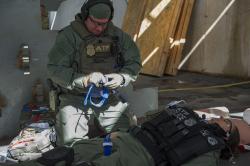
ATF’s Operational Medical Support Program provides special agent medics that support the Special Response Teams and National Response Teams. They provide emergency medical treatment for injuries during missions and training exercises. Medics are also trained to care for law enforcement and fire service canines injured on missions. Medics monitor their team members’ health issues such as hydration, nutrition, sickness, sanitation and rest to ensure they are able complete their critical missions.
In addition to providing emergency medical care, medics also teach tactical medicine to all field agents as part of the Special Agent First Responder course. They also support a variety of National Center for Explosives Training and Research (NCETR) events, including the Raven's Challenge interagency training exercises.
Medics conduct medical threat assessments before any new operation, duty post or national mission. They identify immediate access to critical care providers such as the local trauma center, burn center, emergency medical services, medical helicopters, canine medical treatment centers, and more. Before each mission, medics also verify all available safe driving routes to emergency medical facilities as part of the team’s preparedness plan.
Training

ATF medics are required to complete annual medic training to meet the National Registry of Emergency Medical Technicians (NREMT) requirements. During the training, they learn to apply the skills required as part of their emergency medical technician and advanced emergency medical technician certifications. They are also evaluated by ATF’s medical director as part of their skills assessment program.
To maintain their credentials and support partner agencies’ operations, ATF medics often serve on local emergency medical services teams between ATF response team missions. These additional assignments are part of a continuous learning program that gives them valuable emergency care experience in a wide range of settings, including police aviation and marine bureaus.


